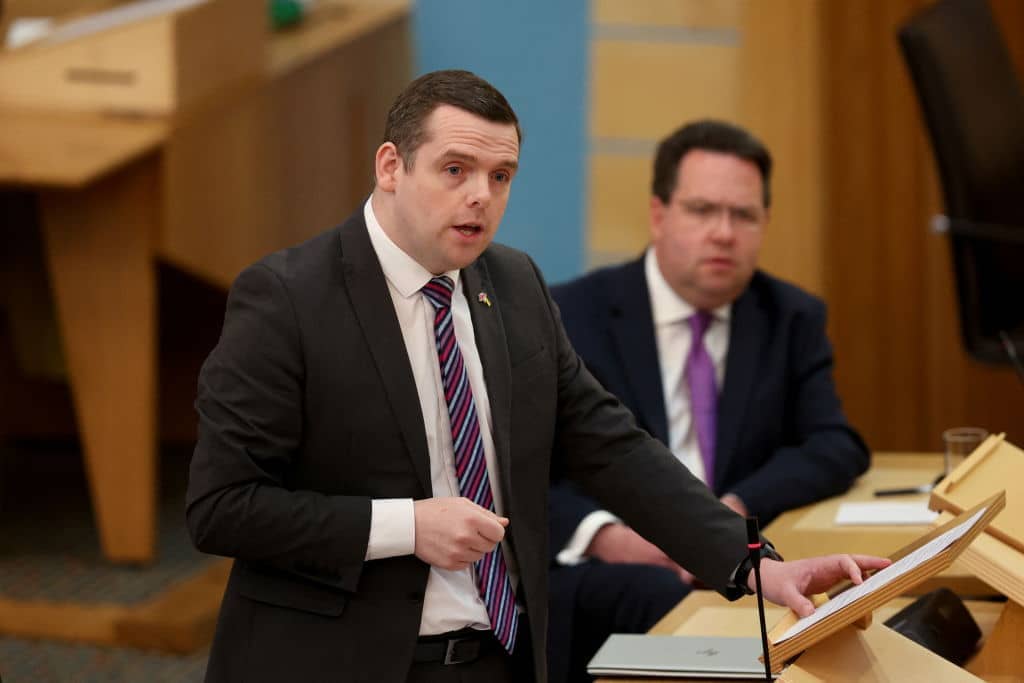If Boris Johnson has a superpower, it is the ability to make others pay the price for his wrongdoing. Today the whipping boy is Scottish Conservative leader Douglas Ross, though it must be said Ross walked clear-eyed into the path of the scourge. That’s another of the Prime Minister’s skills: he can convince people that it would be in everyone’s interest if they maximised their exposure to political risk so that he may minimise his. In the run-up to the Iraq War, a bunch of peace-mongering oddballs flew to Baghdad to offer themselves as human shields and Tories who volunteer to take flak for Boris give off much the same energy.
For reasons passing understanding, Douglas Ross agreed to go on Good Morning Scotland — think the Today programme without the insufferable smugness — and answer questions about the Prime Minister. Presenter Gary Robertson asked him: ‘Is the Prime Minister a truthful man?’ Ross ran through all the now-familiar talking points about ‘a thorough Met police investigation’, that the Prime Minister ‘has accepted that fixed penalty notice and he has paid the fine’, and that Ross ‘share[s] the anger and fury that people have about this’. Eventually, on Robertson’s third attempt, Ross replied that, ‘Yes’, the PM was a truthful man.
Things only went downhill from there. Robertson quoted Boris’s statement to the Commons that all guidance was followed, and asked Ross: ‘Is that true?’ ‘Well, clearly not, because the police have decided that fixed-penalty notices had to be issued,’ the Scottish Tory leader replied. ‘So, he’s a truthful man but in that instance that wasn’t the truth,’ came back the BBC man. Ross’s humiliation was complete. He had agreed to take Boris Johnson’s place in the gunge tank and there was little surprise, but plenty of goopy embarrassment, when the trap door sprang open.
It didn’t have to be this way. Ross took a clear position in the partygate row that, if the Prime Minister broke the rules or misled parliament about the matter, he should resign. (Principled, but also helpfully chiming with the overwhelming majority of Scottish voters.) Then when Boris admitted he had attended a party, Ross called for him to quit, saying he considered the Prime Minister’s apology ‘genuine’ but nonetheless an admission of resignation-worthy behaviour. This was what prompted Jacob Rees-Mogg to brand the Scottish Tory leader ‘quite a lightweight figure’.
That remark did Douglas Ross a lot of good. Even political opponents regarded it, and the superior sneer with which it was delivered, as saying more about Rees-Mogg and his ilk in government than about Ross. Rees-Mogg, then Leader of the House but since demoted to a made-up ministerial post, addressed the leader of the Scottish Conservatives like his forebears might have dressed down a mildly recalcitrant second footman. That Ross refused to bow was commendable.
Then he had to go and ruin it by withdrawing his letter to the 1922 committee and his call for the Prime Minister to resign. His grounds were the gravity of the moment — there was now a war in Europe and Boris was arming Ukraine against the Russian military behemoth — but there was a political consideration, too. Local elections were coming up and divided parties tend not to win. If it wasn’t the council election, it would have been the next Commons or Holyrood poll: you can’t go into an election as Scottish Tory leader, asking for the country’s trust, when you don’t trust the head of your own party. The moment Douglas Ross called for Boris to resign, there could be only three outcomes. Boris would have to quit, Ross would have to quit, or Ross would have to back down.
Ross chose door number three and it looks like it will define his leadership. That’s more than a little unfair given this is the man who brought the Scottish Tories their best ever result in a Holyrood election, outdoing even the feats of Ruth Davidson. The polls don’t look good for May’s elections, hinting at a Labour revival that could see the Tories pushed back into third place. The polls were bad a year ago and Ross defied them all. Maybe he will again this time. Maybe he won’t.
Compounding the perversity of it all is the fact that Ross took a consistently more libertarian stance on lockdowns, restrictions and masks than most Tory politicians. If any Conservative was entitled to say the Prime Minister must abide by the rules he imposed on everyone else, it was Douglas Ross. U-turning to defend his prime minister might make him a good party man, it might even turn out to have been strategically wise, but it has the unfortunate side effect of leaving him looking like, well, a lightweight.
Chalk it up to another exercise of the Prime Minister’s accountability-deflecting superpowers. One Tory leader broke the rules. Another Tory leader said rule-breaking was a resignation matter. Only in Boris Johnson’s leaderless army would it fall to the latter to take incoming fire for the former.







Comments